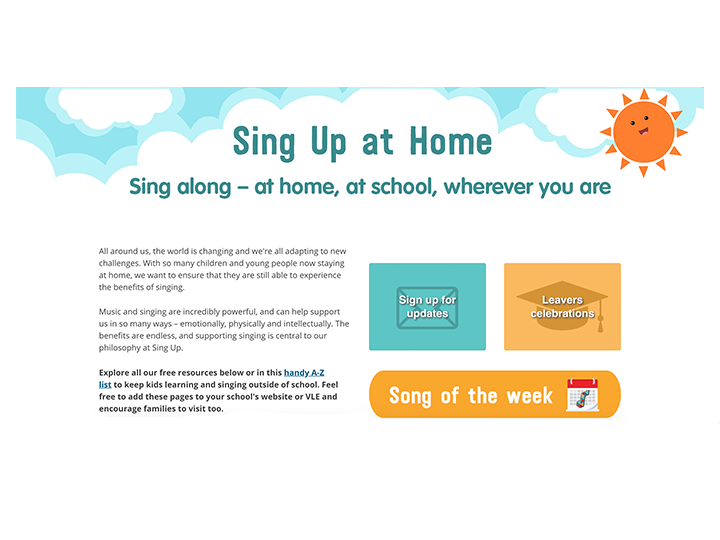
Do boys sing?
’Some boys do, some boys don’t. It’s a teacher thing,’ reckons Martin Ashley.
I’m assuming, of course, that nobody is going to say, 'girls don’t play football’, or girls don’t do science and computers’, so by the same token, why on earth would anyone say that ’boys don’t sing’? The truth is, of course, that some girls don’t play football and some boys don’t sing, but others do in both cases, so what makes the differences?
In a nutshell, it’s you, the teacher! Ask yourself the following questions:
- Am I committed to gender equality and absolutely against stereotyping?
- Do I have high expectations of all children, and do these include high expectations of boys’ singing?
- Can I appreciate that, by the age of 11, boys begin to reach their peak as natural sopranos?
- Do I enjoy sharing music with children?
- Am I lively and enthusiastic when I teach singing?
If you can truthfully answer 'Yes’ to these five questions, your boys will sing!
Tips to get boys singing
Use the right imagery and language
Images need to reflect how the boys from a school like yours look. ’Cool’ has surprisingly little to do with things like repertoire, and far more to do with ’lots of other boys are doing it, so it must be okay’.
It’s the same with language. You’ll turn the boys off singing if you neglect to get a balance of imagery in your language. Draw, for instance, on sporting metaphors to stress the need for big lungs and stamina – and they don’t always have to be about football! Not all boys like football, but there is no doubt that physical strength and skill is important to at least 90 per cent of boys.
Power and volume
I recently visited one of my favourite schools to do some research. Anyone would be amazed by the sheer power and volume of the children singing, at least half of this being contributed by the boys. The teacher was proud of her boys but a little nervous that I might put them off if I asked them questions about boys and singing. I started out by playing the class some examples of recordings by boy soloists. That very same teacher, it turned out, could answer ’yes’ to my questions above, one, two four and five, but not three: ’Can I understand and appreciate that, by the age of 11, boys begin to reach their peak as natural sopranos?’ She was truly amazed at the range and capability of these young singers on CD, which exceeded even her awareness and expectations. ’You mean boys really can sing? Could we sing like that?’ asked one saucer-eyed 10-year-old.
The right role models
Boys of eight to 10 years need role models, but not necessarily more male teachers. The role models they need are boys a little bigger – and stronger – who can show them what their voices could do. For centuries, small boys have learned to sing in choirs by imitating bigger boys. Try playing some of these examples to your class: the Libera choir, The Choirboys, or soloists such as Joseph McManners or Declan Galbraith. Their ages ranged from about 10 to 14 when they recorded their albums.
- Libera: https://youtu.be/Wmm26EMuhzw
- The Choirboys: https://youtu.be/jRWMvj-oimk
- Joseph McManners: https://youtu.be/2UR3Xkp1IdA
- Declan Galbraith: https://youtu.be/OlxP4IY5ctI
Singing is a worthwhile activity
It’s often difficult, of course, to enjoy sharing with children something you don’t feel really confident with yourself. They might well put up with your rubbish football skills, but they won’t tolerate a lack of ability at organising their singing, because they do need some convincing that this is a worthwhile activity. I used to imagine that this was somehow a ’boy thing’ until I had my eyes opened by work on the Girls in Physics project. There I found the situation reversed. Boys would put up with what the children perceived to be a boring teacher, while girls would give up on the grounds that ’physics is for boys’. So, there you have it: ’boys don’t sing’ is not a boy thing, primarily – it’s a teacher thing.
Read Martin Ashley’s article Can boys use Sing Up too?
Nurturing healthy vocal progression in the National Youth Boys’ Choir
’At NYCGB we run the National Youth Boys’ Choir, taking boys aged between 9 and 15, from school Years 5 to 10,’ the artistic team tells us. ’Our duty of vocal care towards its members is particularly important because the boys’ voices will change constantly during these ages. Plus, they will all experience vocal change differently, with some settling rapidly into a changed voice part, and others progressing more gradually. For all boys, voice change will be ongoing to some degree throughout their teenage years and even into their twenties.
‘What is certain is that no National Youth Boys’ Choir is ever the same. From course to course (two are held each year, in the Spring and Summer holidays), every individual voice changes and the whole group undergoes a sort of vocal sea change. All Boys’ Choir courses, therefore, begin with individual vocal assessments for all members. Following their assessment, the singer is assigned to the correct section for their vocal development as presented: Trebles for unchanged voices, and Cambiata Voices for boys going through vocal change. Assessment is continuous, with section leaders monitoring all singers throughout the course and re-assigning them if appropriate.
‘Trebles and Cambiata Voices rehearse separately and together on the course and perform separately and together at the closing concert. Choosing repertoire carefully ensures that both groups are stretched musically without risking vocal health. Finding the right repertoire can be challenging, and not just because changing voice tenors, baritones and basses have relatively small and insecure ranges. Many of them enjoyed two-octave ranges as trebles: their new vocal lines can appear rather dull by comparison. One solution is to offer different types of challenge, such as repertoire in foreign languages, and performance memorisation and choreography. We are also helped by the growing range of dedicated specialist repertoire such as the Emerging Voices series from Oxford University Press and the Changing Voices anthology from Edition Peters (see More Online).
’Boys who stop singing at 13 or 14 are unlikely to return to choir at 17 or 18 – it’s an unavoidable fact that other priorities and pressures tend to establish themselves in the interim. The desire to keep boys singing through voice change means that we act as a valuable progression opportunity for boys who can no longer sing in church or cathedral choirs because they are too young to ’join the adults’ on a practical level. And we make a point of welcoming and encouraging boys who are actively going through vocal change to audition for the National Youth Boys’ Choir in the Autumn each year.



